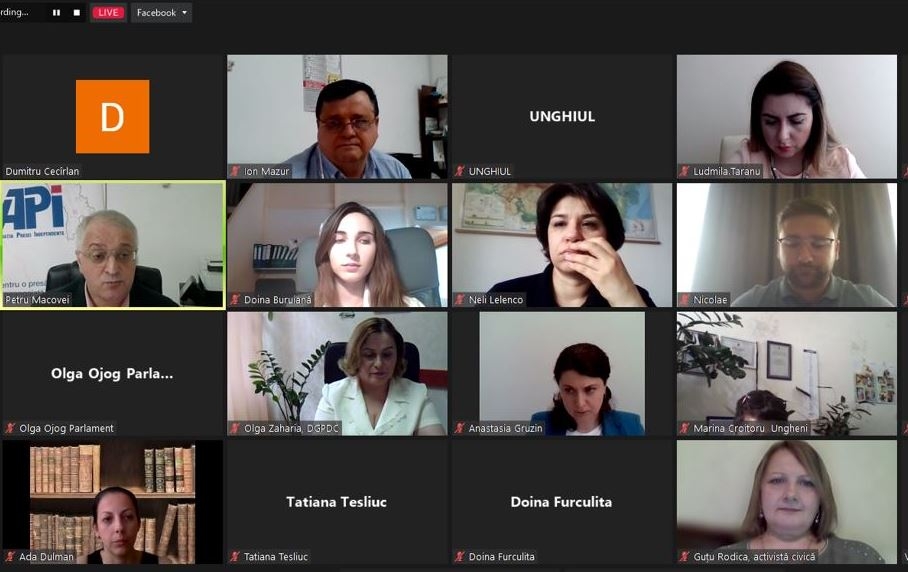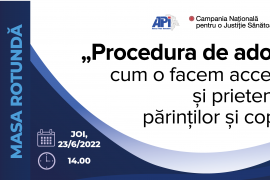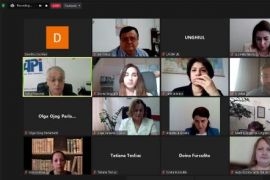back
Adoption Procedures Can Be Simplified While Ensuring Supreme Interest Of Child

Zoom.us capture
Moldovan legislation on adoption is good and the existing procedures must be respected in order to safeguard the supreme interest of the child, i.e. to ensure adequate conditions for his/her harmonious growth and development. Adoption procedures can be improved, and so can communication among authorities, specialists and adoptive parents. These and other views were expressed by participants at the round table “Adoption Procedure: How To Make It Accessible and Friendly to Parents and Children," held by API in partnership with Civic Association “Shelter and Care" (Adăpost și Alinare) on 23 June 2022.
Rodica Guțu, President of “Shelter and Care”, who is also an adoptive parent, talked about the challenges faced by people who want to adopt children in our country as well as about the measures the authorities should take to facilitate adoptions. "At first glance, things seem simple, and if you follow the procedure laid down by law, you should have the adoption act in your hand in a year and be happy to become a parent. In reality, however, things are much more complicated. The process is bureaucratic and implies a great deal of paperwork for the parents-to-be, some of which are not even necessary. It is very difficult to determine the child's status for adoption, especially in poor families where children suffer from poor conditions and parents do not take care of them. Such families continue to receive social benefits from the state, but this does not solve the problem and does not make the parents responsible," R. Gutu said. In her opinion, the international adoption procedure is not transparent enough, and the committees that monitor international adoptions should include more specialists-practitioners, while respecting the obligation of non-disclosure of the secrecy of adoption.
Adoption procedures are complicated but necessary because they are in the best interests of the child, said Anastasia Gruzin, a senior consultant in the Directorate for the Protection of Children's Rights and Families with Children at the Ministry of Labour and Social Protection. "The authorities work to keep the child in their birth families. Only where there are no other solutions is adoption used. The problem with national adoption is that prospective parents want one- and two-year-olds, but what should we do with 7-10-year-olds?" A. Gruzin noted. As far as international adoptions are concerned, there are a number of steps that prospective adopters have to take as well as a number of approvals that have to be obtained from public institutions: "Usually, older children or children with disabilities, including severe disabilities, go for international adoptions. At present, foreign citizens can only adopt children from our country through organizations accredited in Italy and the US, but Moldovan citizens living abroad can also do so from other countries." The representative of the Ministry of Labour and Social Protection said that more than 500 children were registered for adoption in Moldova at present, and more than 200 people were waiting to become adopters, as well as 25 foreign adopters.
During the debate, Olga Zaharia, Head of the Care and Adoption Department, General Directorate for the Protection of Children's Rights of the Municipality of Chișinău presented statistics on the number of children and families in care and came up with some proposals to streamline the work. “In 2022, in Chișinău, there are 125 families who want to adopt children and 210 children who want a family, but most of the children are over 7 years old and are not in demand, unfortunately. There is a woman who has been waiting to adopt a child since 2012, but has not found one yet because she wants a child up to three years old. My colleagues and I have made many suggestions on how to facilitate the adoption process. It is thus important to ensure a continuous process of professional training to strengthen the capacities of specialists, to develop the national information system for adoption, to simplify administrative procedures, and to facilitate communication among institutions working in the national adoption system. We also advocate for improving the existing legal framework with a focus on empowering parents whose children temporarily remain without parental care," the official stressed.
According to Marina Croitoru, head of section in the General Directorate for Social Assistance and Family Protection in Ungheni, effective communication is necessary for better results in the adoption process: "It is important how one speaks with the adopters. Some come to us for one child and go home with two or three. In Ungheni, all children up to the age of 12 have already been adopted".
Lawyer Nicolae Frumosu made a review of the legal framework on adoptions. He noted that the list of documents that prospective parents had to submit could be reduced and some documents could be replaced by an applicant’s sworn statement. In addition, the guardianship authority should be empowered to collect information about the adopters on its own. The legal advisor also spoke about the gaps concerning the time limits for validating an adopter's certificate and the procedure for removing a certificate after three decisions of mismatching adopters with children, etc.
Communication between professionals and prospective parents is very important in the adoption process. "We have noticed some communication problems between authorities and adopters. It is a very good proposal to have meetings of adoptive parents with the authorities to discuss their experience and the problems they face, and to make the authorities aware when the procedures are too complicated. Equally important is that those who want to adopt a child can freely access all the information they need, but also interact with those who have previously adopted children, in order to better understand what they need to do and assess any possible risks," concluded Petru Macovei, API Executive Director.
The full recording of the round table is available HERE.
The event took place within the Sound Justice Campaign, implemented by the Association of Independent Press (API) in partnership with a group of Moldovan NGOs.

